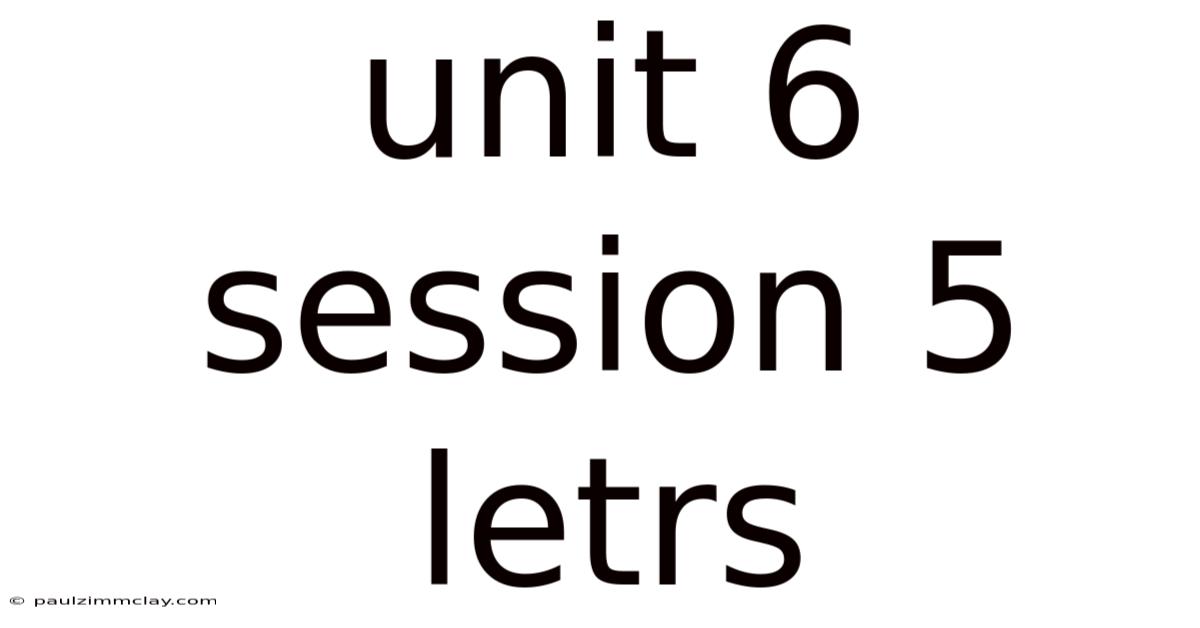Unit 6 Session 5 Letrs
paulzimmclay
Sep 13, 2025 · 4 min read

Table of Contents
I cannot find any publicly available information regarding "Unit 6 Session 5 LETRS." LETRS (Language Essentials for Teachers of Reading and Spelling) is a widely used professional development program, but the specific content of a particular unit and session isn't readily accessible online. The curriculum is proprietary and access is typically restricted to those who have purchased the program.
Therefore, I cannot write a 2000+ word article detailing the contents of "Unit 6 Session 5 LETRS." To do so would require access to the copyrighted materials, which I do not have.
However, I can offer a general overview of common topics covered in LETRS, which might give you some insight into what you might find in a unit on this subject. LETRS typically focuses on the following key areas:
Understanding LETRS and its Potential Content
LETRS is a comprehensive professional development program designed to equip educators with the scientific knowledge and practical skills necessary to effectively teach reading and spelling. The program dives deep into the science of reading, covering aspects such as:
1. Foundational Skills: This is a cornerstone of LETRS. It covers:
- Phonological Awareness: Understanding the sounds of language, including rhyming, syllable segmentation, and phoneme manipulation. A unit might focus on specific skills like identifying initial, medial, and final sounds within words, or blending and segmenting sounds to read and spell words.
- Phonics: The relationship between letters and sounds. LETRS likely emphasizes systematic and explicit phonics instruction, covering various letter-sound correspondences, including consonant blends, digraphs, and vowel teams. A session might focus on a specific phonics pattern or skill, like teaching students to decode words with silent 'e'.
- Fluency: The ability to read accurately, quickly, and with expression. Training might involve strategies for improving reading rate, accuracy, and prosody.
- Vocabulary: Understanding the meanings of words. This could involve direct instruction of vocabulary words, using context clues, and developing word-learning strategies.
2. Reading Comprehension: This section delves into the strategies and skills needed to understand text. It might cover:
- Text Comprehension Strategies: Techniques like making predictions, asking questions, visualizing, and summarizing. A session could focus on a specific strategy like using graphic organizers to comprehend informational texts.
- Reading Comprehension Skills: Identifying main ideas, supporting details, and inferences. This could also involve instruction on different text structures and genres.
3. Spelling: LETRS extensively covers the orthographic aspects of language. This includes:
- Phonics-Based Spelling: Connecting letter-sound relationships to spelling.
- Morphemic Analysis: Understanding word parts (prefixes, suffixes, roots) to improve spelling accuracy.
- Spelling Patterns and Rules: Learning common spelling generalizations and exceptions.
4. Assessment and Intervention: LETRS emphasizes the importance of ongoing assessment to monitor student progress and adapt instruction accordingly. This includes:
- Formative Assessment: Ongoing assessment to track student learning during instruction.
- Summative Assessment: End-of-unit or end-of-year assessments to measure overall progress.
- Differentiated Instruction: Adapting teaching methods to meet the needs of diverse learners.
- Intervention Strategies: Providing support for students who are struggling with reading or spelling.
5. Language Development: This explores the broader aspects of language development, including:
- Oral Language: The importance of developing strong oral language skills as a foundation for reading and writing.
- Grammar and Syntax: Understanding sentence structure and grammatical rules.
- Semantics: Understanding the meanings of words and sentences.
Hypothetical Content for a Unit 6 Session 5 (Speculative):
Since I lack access to the specific LETRS curriculum, I can only offer a hypothetical example of what might be covered in a Unit 6 Session 5. This is purely speculative:
It's plausible that Unit 6 might focus on more advanced reading comprehension strategies or spelling patterns. A Session 5 within that unit could then cover a specific area, such as:
- Advanced Comprehension Strategies for Informational Text: This session could explore strategies for analyzing complex informational texts, such as comparing and contrasting different perspectives or identifying author's purpose. It might incorporate activities focusing on analyzing evidence, drawing conclusions, and evaluating arguments presented in non-fiction materials.
- Morphology and Etymology in Spelling: This session could delve deeper into morphemic analysis, including the origins of words and how understanding their history can improve spelling accuracy. It might explore Greek and Latin roots, prefixes, and suffixes commonly found in English words.
- Multisyllabic Word Reading and Spelling: This session could focus on strategies for decoding and encoding words with multiple syllables, including understanding syllable types and applying phonetic rules across syllable boundaries.
Conclusion:
Without access to the actual LETRS materials, a detailed article on Unit 6 Session 5 is impossible. However, this overview provides a general understanding of the topics typically covered in LETRS and offers a plausible speculation of what the specific session might entail. Remember that the best way to learn the content of a specific LETRS unit and session is to access the official program materials through authorized channels.
Latest Posts
Latest Posts
-
Ap Government Unit 2 Test
Sep 13, 2025
-
Ap Statistics Chapter 4 Review
Sep 13, 2025
-
Push Polling Ap Gov Definition
Sep 13, 2025
-
Which Antimicrobial Protein Triggers Inflammation
Sep 13, 2025
-
Ap Chemistry Unit 1 Frq
Sep 13, 2025
Related Post
Thank you for visiting our website which covers about Unit 6 Session 5 Letrs . We hope the information provided has been useful to you. Feel free to contact us if you have any questions or need further assistance. See you next time and don't miss to bookmark.